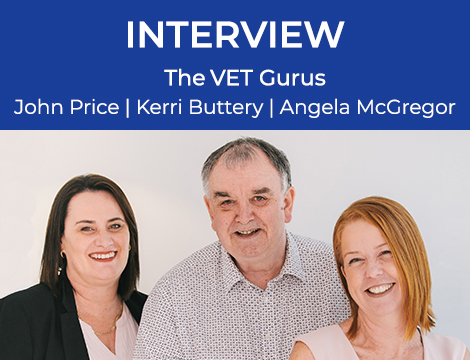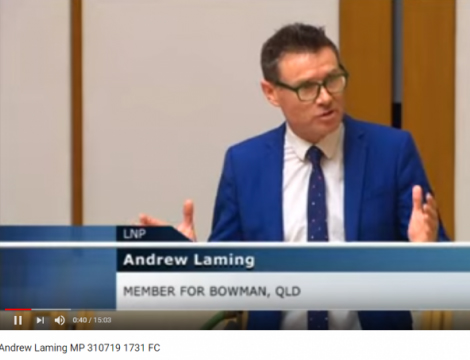ASQA’s Sample AQF documentation gets updated to meet the requirements of third-party arrangements
The ASQA Fact Sheet Sample AQF documentation has been updated for a clarification in light of recent Third Party arrangements guidance.
https://www.asqa.gov.au/news-publications/publications/fact-sheets/sample-aqf-documentation
The fact sheet now states “Only the name of the issuing organisation (your RTO) can be included on testamurs/statements of attainment. Refer to the Fact sheet—third party arrangements for more information”
All VET Providers should take note of this clarification and review any AQF documentation arrangements where other organisation’s names or logos might be used in prior ‘dual branding’ arrangements of testamur documentation.
You can read more information here.
New $1.6 billion blueprint aims to lift the status of teaching
Australia’s best and brightest school graduates are turning their backs on teaching – but a $1.6 billion reform package proposed by the Grattan Institute aims to lift teaching’s slumped professional status.
You can read more information here.
Tech challenge leaves Australian Unis vulnerable
Where pen and paper were once king, portable pads now reign supreme. We are no longer at the point where tech is a nice-to-have addition to the learning process, but rather a revolution in culture and lifestyle that educational institutions need to ensure their future success.
With faster and more innovative technologies entering the market every day, there is no shortage of solutions built to accommodate this shift in behaviour and students value quick access to smart technologies. So much so, that a huge 85 per cent recently rated up-to-date technology or good online options as either the most important or highly important factor when choosing a college or university. So, this begs the question, why aren’t educational institutions falling over themselves to provide the highest spec tech for their students?
You can read more information here.
Australian universities are overly reliant on international students for revenue
Australian universities have been warned against overly relying on international students as their major source of revenue.
A report by The Centre for Independent Studies (CIS) is sounding the alarm, calling the practice a “high-risk” and “multi-million dollar gamble” on taxpayers’ money.
You can read more information here.
TAFE NSW campuses join I-CAR Education Resource
I-CAR and TAFE NSW Wagga Wagga and TAFE NSW North Wollongong Campuses have signed the Education Resource Agreement to deliver select I-CAR courses to meet the requirements for AUR32116 – Certificate III in Automotive Body Repair Technology and AUR32416 – Certificate III in Automotive Refinishing Technology training packages for apprentices.
Ian Chalmers, Head of Department, Autobody South Region said “With TAFE NSW being the leading provider of vocational education and training in Australia, we aim to provide high quality, personalised vocational education and training to build prosperity, sustainability and innovation throughout New South Wales. We’re passionate about helping you build skills, create success and become inspired to achieve a better future. We believe in helping students and businesses to unlock their potential and helping them achieve long term success.”
Read more here.
Spotlight on Vocational Education & Training
Today the country celebrates the important contribution Australia’s Vocational Education and Training (VET) makes to the economy and to the lives of everyday Australians, with National Skills Week.
“National Skills Week is an occasion to promote our vocational training system as being equal to a university education to school leavers, job seekers and career changers who are looking for pathways into good job outcomes and long term fulfilling careers,” said the Australian Chamber’s director of employment, education and training, Jenny Lambert.
“We should be celebrating the many successes of VET graduates – their valuable skills are much needed in the economy. Often a graduate of an engineering or construction apprenticeship goes on to run their own business, employing people and reaping the rewards of self-employment.
“This week is also an opportunity to focus on the vocational training system. It should be seen as a catalyst for industry and training providers to work together with the Federal, State and Territory governments to improve the system for students and employers.
Ms Lambert said the Council of Australian Governments’ latest agreement to commit to a new vision for VET and seek a road map for genuine reform was a vital start.
“We also need to highlight the benefit of vocational education to the broader public. Business and Governments need to work together with schools, career advisers and training providers to understand where the job opportunities are for the future and encourage students to choose VET as a career pathway.”
For more information please refer here.
Government-funded students and courses – January to March 2019
This publication provides a summary of data relating to estimated students, programs, subjects and training providers in Australia’s government-funded vocational education and training (VET) system.
For more information, please refer here.
Rising international student numbers in New Zealand
Official statistics from the Ministry of Education show that international student numbers made up 18% of university students throughout New Zealand in 2018. NZISA welcomes this increase, but warns universities that rising numbers must be matched by improved wellbeing policies to continue the sustainable growth of the export education sector.
For more information, please refer here.
Top universities lowering English standards – Report
A new report says top Australian universities are using backdoor entry programmes to lower English standards for overseas enrolments amid a reliance on foreign student income that is unmatched in the English-speaking world, write Jordan Baker and Adam Carey for the Brisbane Times.
The Centre for Independent Studies (CIS) research paper said the institutions, including the universities of Melbourne, Sydney and New South Wales, were compromising standards and taking “massive financial risks in pursuit of this pot of gold”. The report’s author, Sydney University sociologist and CIS fellow Salvatore Babones, called on vice-chancellors to urgently raise admissions standards and reduce international enrolments to reduce their vulnerability to sudden revenue collapse.
Overseas students now make up a quarter of Australia’s university enrolments, and two of the country’s most prestigious institutions, the universities of Sydney and New South Wales, rely on a single country, China, for almost a quarter of their total revenue, the report said.
Full report on the Brisbane Times site
International student fallout becomes too big to ignore
Last week’s damning report on Australia’s international trade from the Centre for Independent Studies (CIS) has finally awoken the mainstream media to the substantial hidden costs arising from our universities’ extreme over-exposure to international students.
In its report, the CIS warned that Australia’s universities have badly lowered standards to gain the world’s biggest per-capita intake of international students:
For more information please refer here.
Destination Australia open for applications
The Hon Dan Tehan MP, Minister for Education, officially launched the Destination Australia Program today. The 2020 application round will be open for four weeks from Monday 19 August 2019 until Thursday 12 September 2019.
The aim of the Destination Australia Program is to attract and support international and domestic students to study in regional Australia, to grow and develop regional Australian tertiary education providers and offer students a high quality learning experience.
The $93.7 million Destination Australia Program High-quality allows tertiary education providers, including vocational education and training and higher education providers, to apply for funding through a competitive grants process to administer and promote scholarships for Australian and international students who live and study in regional Australia. Scholarships are valued at $15,000 per student, per year, and will be available for students undertaking a Certificate IV through to PhD.
For the purposes of the Destination Australia Program, a regional location is classified as any area outside of Major Cities of Australia, in line with the Australian Bureau of Statistics’ Australian Statistical Geography Standard Remoteness Structure.
Further information about the Destination Australia Program including how to apply can be found at www.education.gov.au/destination-australia.
Chinese students have already stopped coming to Australia
While the government hauled the Group of Eight universities to Canberra to caution them over research collaboration with China and the Centre for Independent Studies warned of a “catastrophe” if Beijing stopped students coming to Australia, the vice-chancellor of Melbourne University was in India.
Professor Duncan Maskell was the latest of Australia’s higher education chiefs to make the trek to the subcontinent in search of new markets. Unusually among VCs he stopped at Jakarta on the way back to tie up some new connections for the university.
If you ask Professor Maskell what he hopes to get from such markets he bristles: “What do you mean by markets? Supermarkets?”
He is not alone in university chiefs resisting the implication that Australian universities are in the business of student markets.
Privately, universities admit the flow of students from China is so large it is effectively commoditised.
For more information please refer here.
New performance-based funding system for universities
Australia’s federal government has promised to allocate an additional AU80 million (US$54 million) to universities next year – but only on a ‘performance-based’ set of criteria.
Adoption of the so-called ‘performance-based funding’ scheme was the main recommendation in a report to the government by an independent panel of senior academic leaders.
Subsequently, the government announced that funding for bachelor level courses would be capped at 2017 levels for 2019. Federal Education Minister Dan Tehan said that from 2020, funding for student places would increase according to population growth in the 18- to 64-year-old age bracket.
He added, however, that universities would only be able to access additional grants if they met specified performance requirements.
For more information please refer here.
Telugus second largest Indian group on Australian campuses
Telugu students are the second largest group from India on Australian university campuses, reveals an internal study by Australian education providers based on the number of visa applications. Punjab students make for the biggest group from the country.
A total of 5,161 students from Telangana and 2,299 from Andhra Pradesh have applied for visas this year, according to the study. Punjab region students are said to be 12,644 while those from Punjab, Haryana and Chandigarh combined are 17,277.
The actual visa issuance was around 80% of applications for Telugu students while that for Punjab students would be lesser than Telugu students, say education consultants. “The actual figures can’t be revealed as they are yet to be made official,” a consultant says, seeking anonymity.
For more information please refer here.
Why reskilling can seem so difficult
Well for many of us, work not only provides us with an income but an identity as well. If we work in the medical profession, we may be known as a doctor or nurse. We ask each other, “what do you do?”, as our daily tasks often define our identity. In this context reskilling into a new role is not just about gaining new skills to transition. It is also a shift in our identity.
At an Organisation for Economic Cooperation and Development (OECD) conference in 2018, Jean-Michel Blanquer, the French Minister for Education explained this point further, “[Reskilling] is not just about supply meeting demand. It is essentially a human process: people digging down deep within themselves to bring new skills to the surface.”
It is clear that the effectiveness of reskilling is not just about acquiring new skill sets, it’s also about a change in mindset, shifting from jobs to skills, and away from our occupation defining us. So how do we equip workers with the mindset to more easily transition across jobs and reskill when necessary?
For more information please refer here.
From Netflix to Edflix: now it’s on-demand education
The future of tertiary education is an on-demand, Netflix-style model where learners get to pick when, what and how they study, says Macquarie Business School Associate Professor Lan Snell. As organisations restructure to deal with constant disruption from new technologies, the nature of work and workers are fundamentally changing, says Snell – opening up new horizons for education providers such as Macquarie University.
“We have had what is called a front-loaded model of education, where most of the formal education is done in one place, typically at the beginning of a career,” says Snell, the Academic Program Director for Macquarie’s Global MBA.
“But now, to keep apace of those constant changes in the marketplace, we need to continually reskill, upskill and retrain ourselves, and that’s the spirit of life-long learning.
For more information please refer here.
Student debt is an impediment to lifelong learning
About 45 million Americans now collectively owe $1.6 trillion in student debt, and it’s a burden that is taking a toll on both workers and their employers.
A recent survey found that half of employees say they feel worried about student loan debt most or all of the time — and more than 65 percent say they have considered finding a second job to help them keep up with their loan payments. Another found that some 40 percent of borrowers believe student debt has stopped them from obtaining their career goals.
Employers should be troubled by these findings. They paint a picture of a generation of workers paralyzed by student loan debt, fueling unprecedented turnover at a time when the labor market is already tightening. About 40 million employees quit their job last year. And churn is even higher for millennials (now the largest generation in the workforce) which accounted for more than half of these separations.
For more information please refer here.
TAFE figures hit new low
Enrolments at Albany’s TAFE campus last year dropped to their lowest level since it opened in 2013.
Department of Training and Workforce Development figures showed 3786 students enrolled at South Regional TAFE Albany in 2018, down nearly 19 per cent on its opening year.
That continued a trend of decreasing enrolments recorded in the previous year.
South Regional TAFE Albany opened with 4653 students in 2013, and enrolments remained steady in 2014 before dropping to 4100 in 2015.
For more information please refer here.
The universities which rely most on international students for cash
One university received almost a billion dollars in international student fees in 2018, while eight received more than 30 per cent of their revenue from international student fees, with major sandstone universities spearheading a race for the lucrative market.
An analysis of university financial statements reveals that three of the elite Group of Eight universities – University of Sydney, University of New South Wales and Monash University – earned more than one in every three dollars from international students last year in a rising trend.
For more information please refer here.
Federal Government launches an investigation into foreign interference at Australian universities
Federal Education Minister Dan Tehan announced the new measure, which he said would be a collaboration between government, security agencies and the university sector.
He said it would have a wide-ranging role in looking at foreign interference in the nation’s education sector, from assessing cybersecurity to the theft of research and intellectual property.
Mr Tehan said he was concerned at recent reports that information about pro-democracy students had been collected during protests about China.
“One of the things that the taskforce will be doing will be looking at security on our university campuses, to make sure that students can go about their business freely, and be able to express their views freely,” he said.
Punches were thrown at the University of Queensland last month as students clashed over their views on China and pro-democracy protesters in Hong Kong.
For more information please refer here.
International students stranded, asked to pay for new visas as education provider goes bust
The private business institute’s collapse in New Zealand has left more than 200 international students in the lurch, with students now claiming that neither the education provider nor the regulator, New Zealand Qualification Authority (NZQA) are coming to their rescue.
NZQA claims that the Kiwi Institute of Training and Education known as KITE had requested them to cancel their registration as a private training establishment, as a result of which it was put into liquidation, earlier this month.
For more information please refer here.
US No Longer Top Choice for Foreign Students
In the past decade, the U.S. saw a steady rise in the number of international students who enrolled in colleges and universities here. But because of high tuition and fees, immigration concerns, divisive political talk and perceived crime, international students are considering other options. Top competitors to the U.S. include Canada, Australia, New Zealand, Europe and China. These countries are making it less expensive and more convenient for students.
For more information please refer here.
Canada wants to diversify international student intake
Canada’s new five-year international education strategy is calling for greater diversity, innovation and global ties.
The federal government’s strategy, released this week, recognizes the strong presence of international students in Canada, noting that 570,000 foreign study permit holders contributed over $21 billion to the Canadian economy since the start of 2019.
A key aim of the new $148-million strategy is to increase the variety of source countries for international students. It has pledged almost $30 million to diversify recruitment efforts in this domain.
As is, more than 50 per cent of Canada’s international students come from China and India, and they are concentrated in large cities such as Calgary, Toronto and Vancouver. The strategy’s expanded recruitment efforts will target Mexico, Colombia, Brazil, Vietnam, the Philippines, Indonesia, Thailand, Morocco, Turkey, France and Ukraine.
For more information please refer here.
How Rod Jones grew Navitas
Australian universities could learn from the recipient of the AFR Higher Education Award for Lifetime Achievement, 2019, Rod Jones, co-founder and part owner of education company Navitas.
Navitas prepares international students for university and had revenue of nearly $1 billion in 2018, drawn from a global operation.
For more information please refer here.
Australia’s education system is stagnating at best, heading backwards at worst.
We have recorded a decade of declining school and student performance against OECD standards and the most recent NAPLAN results revealed there’s been no significant improvement across most year levels since 2008.
Children and young people who are disadvantaged are most vulnerable to the impact of an education system that is no longer fit for purpose or designed for their future needs. Mounting evidence is telling us that too many learners are struggling with an education system that is not setting them up for success in life and work.
Australia is currently ranked as having the fourth-most socially segregated school system in the OECD, with 51% of disadvantaged students concentrated in disadvantaged schools. We have also seen the largest increase in social segregation since 2006.
Education is not meeting the needs of a diverse community of learners at a time when skills and jobs are changing faster than ever before.
For more information please refer here.
VET in Schools participation declines
Over a five year period, the number of school students undertaking vocational education and training (VET) as part of their Senior Secondary Certificate of Education (SSCE) has declined by 6.7% to 230 700, according to new data released today by the National Centre for Vocational Education Research (NCVER).
The report VET in Schools 2018 also reveals that the number of school-based apprentices and trainees decreased to 18,200 in 2018, down 13.3% from 2014, while those undertaking other VET that contributed to their SSCE decreased to 212,500 in 2018, down 6.0% from 2014.
Certificate II qualifications continued to be the most popular (undertaken by 54.8% of all VET in Schools students), however the number of students undertaking qualifications at this level has declined by 2.6% since 2014.
In contrast, the number of VET in Schools students enrolled in Certificate III qualifications has increased by 1.7% since 2014, with 34.6% of all students undertaking training at this level in 2018.
Tourism, travel and hospitality remains the most popular training package, with 14.8% of all VET in Schools students undertaking qualifications in this training package in 2018.
Business services training package was the second most popular, with 12.4% of VET in Schools students undertaking qualifications in this training package in 2018, followed by the Sport, fitness and recreation training package.
Australian vocational education and training statistics: VET in Schools 2018 is now available from: www.ncver.edu.au/publications.
For the latest data and further year-on-year and state and territory comparisons please visit here.
National Skills Needs List to be updated
The government will replace the National Skills Needs List (NSNL) after a review of the program.
Since 2007, the NSNL has determined which jobs are eligible for payments under the Incentives for Australian Apprenticeships (IAA) program.
Senator Michaelia Cash announced the modernisation project on Thursday.
“The review will ensure skills shortages are identified using a forward-looking, up-to-date methodology and that apprenticeship incentives are targeted at addressing critical skills shortages in the Australian economy,” Minister Cash said.
For more information please refer here.
Education policy should be based on evidence and worthwhile goals, not on borrowed fads
This week has seen the annual commotion around Australia’s standardised testing regime, the National Assessment Program — Literacy and Numeracy.
Once again, despite huge increases in taxpayer funding, there is little to give parents, employers and the public any confidence that students are mastering the essential knowledge and skills they need for success in life and work.
The reality is that NAPLAN cannot deliver the improvements we seek unless it — like the other elements of the so-called national education architecture — is rebooted in purpose, design and operation to establish the highest possible national standards of teaching and learning, from kindergarten to Year 12.
For more information please refer here.
ESOS Changed Reporting Requirements
Amendments to the Education Services for Overseas Students Regulations 2019 (Cth) will mean that from 1 October 2019 providers will be required to include additional student data on the Provider Registration and International Student Management System (PRISMS) database. The reporting obligations includes information on agents, English language proficiency tests and breaches of visa conditions.
For more information please refer here.
Education sector could boost a soft economy
The higher education sector could be used to boost a flat local economy, with the deteriorating global trade environment adding to the case to increase student numbers, Deloitte Access Economics partner John O’Mahony said.
For more information please refer here.













